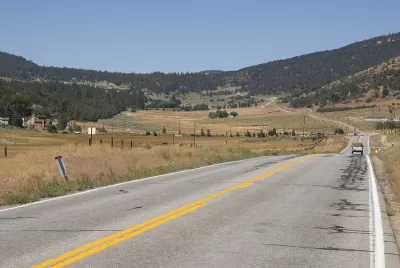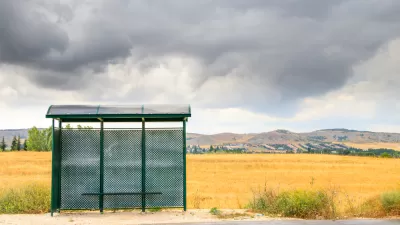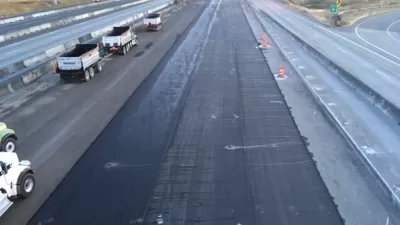Despite the reputation of rural America as "drive-through country," many residents depend on walking and transit to get around.

A new report argues for the urgent need for sustainable public transportation options in rural communities. But, according to Kea Wilson, "the federal politicians who govern them are stonewalling the very legislation that could give it to them, like President Biden’s Build Back Better Act."
The study from Smart Growth America and Third Way found that rural commutes have risen by 15 minutes in 16 years, "thanks in part to increasing consolidation in large employers and the continued proliferation of car-centric transportation planning in their communities." Meanwhile, "[s]hopping trips are 14 percent longer, and the average social or recreational trip has swelled from just over 16 miles at the turn of the century to nearly 18 miles." This adds up to car trips that were 41 percent longer in 2017 than in 2001.
This phenomenon, the report's authors say, is "more avoidable than we might assume." Even in rural areas, it's possible for people to access everyday needs without a car. But many rural legislators oppose legislation that would create better public transit in their regions, viewing rural America as "drive-through country." The report points out that "in reality, the majority of U.S. counties in which 10 percent or more of the population are living without access to a car are rural." rural America, the authors say, has more density than urbanites imagine. "Making those dense centers actually accessible to people on foot, though, can be a challenge, particularly in communities where the town 'main street' is a highway."
The authors call for state leaders to prioritize pedestrian infrastructure and safety, while suggesting that the federal can pave the way for improved rural infrastructure by "revising outdated manuals used by transportation agencies to design streets, including in the Manual on Uniform Traffic Control Devices (MUTCD), and reframing them and removing standards and guidance that lead to streets that are hostile to or dangerous for those outside of a vehicle." The report also recommends a series of other reforms, including more robust data and investment in transit, which advocates hope the Build Back Better plan can deliver.
FULL STORY: Study: Rural Areas Need Safe, Sustainable Transportation Now

Study: Maui’s Plan to Convert Vacation Rentals to Long-Term Housing Could Cause Nearly $1 Billion Economic Loss
The plan would reduce visitor accommodation by 25,% resulting in 1,900 jobs lost.

North Texas Transit Leaders Tout Benefits of TOD for Growing Region
At a summit focused on transit-oriented development, policymakers discussed how North Texas’ expanded light rail system can serve as a tool for economic growth.

Why Should We Subsidize Public Transportation?
Many public transit agencies face financial stress due to rising costs, declining fare revenue, and declining subsidies. Transit advocates must provide a strong business case for increasing public transit funding.

How to Make US Trains Faster
Changes to boarding platforms and a switch to electric trains could improve U.S. passenger rail service without the added cost of high-speed rail.

Columbia’s Revitalized ‘Loop’ Is a Hub for Local Entrepreneurs
A focus on small businesses is helping a commercial corridor in Columbia, Missouri thrive.

Invasive Insect Threatens Minnesota’s Ash Forests
The Emerald Ash Borer is a rapidly spreading invasive pest threatening Minnesota’s ash trees, and homeowners are encouraged to plant diverse replacement species, avoid moving ash firewood, and monitor for signs of infestation.
Urban Design for Planners 1: Software Tools
This six-course series explores essential urban design concepts using open source software and equips planners with the tools they need to participate fully in the urban design process.
Planning for Universal Design
Learn the tools for implementing Universal Design in planning regulations.
Ascent Environmental
Borough of Carlisle
Institute for Housing and Urban Development Studies (IHS)
City of Grandview
Harvard GSD Executive Education
Toledo-Lucas County Plan Commissions
Salt Lake City
NYU Wagner Graduate School of Public Service





























